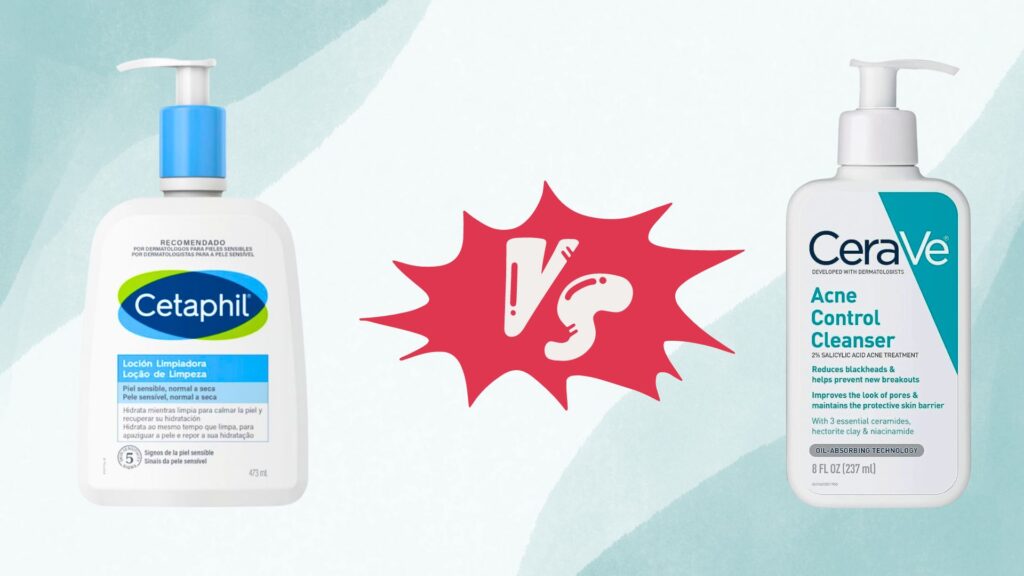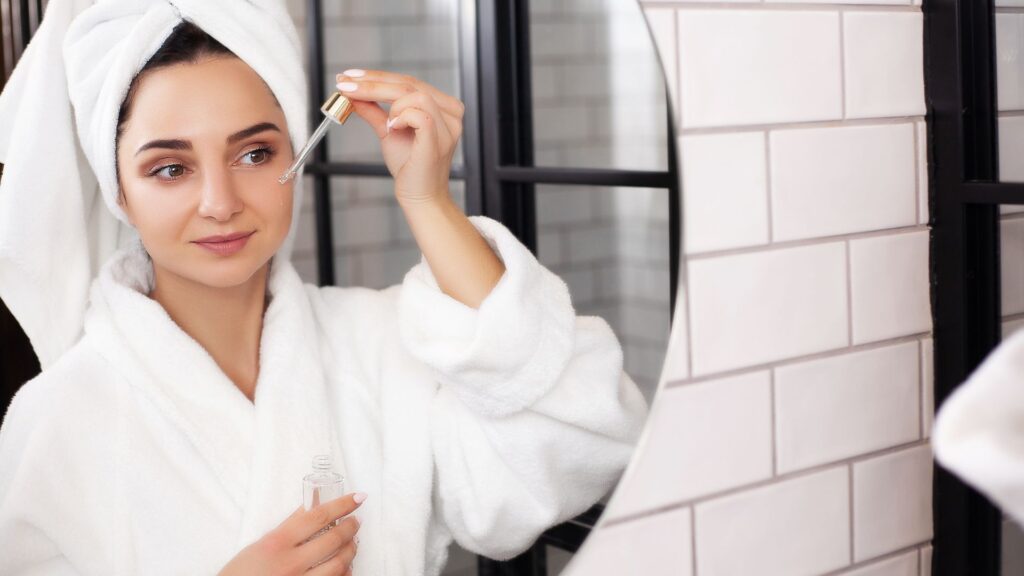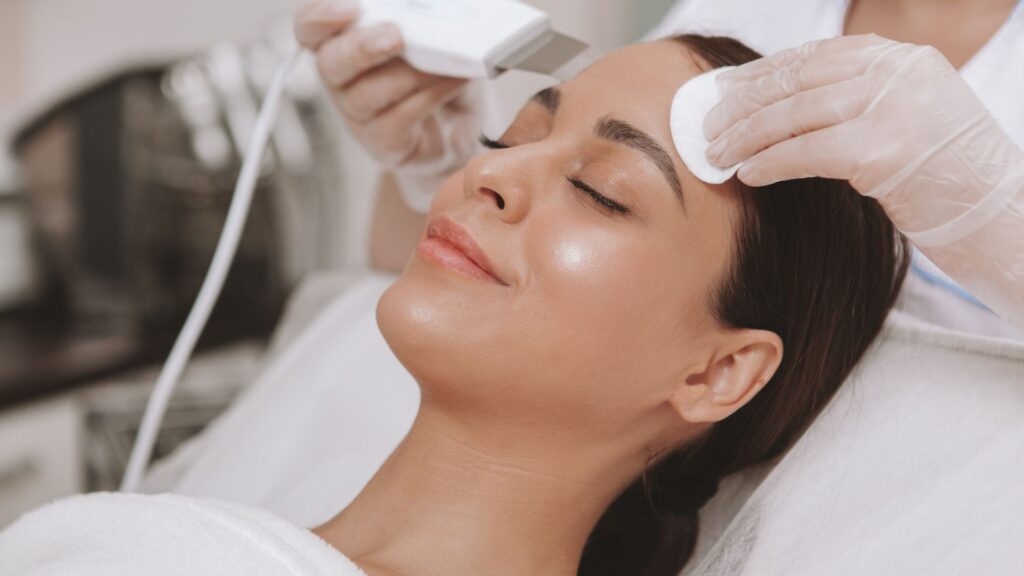Ever feel like you’re stuck in a skincare tug-of-war, being pulled between the giants Cetaphil and CeraVe?
You’re not alone!
With all the buzz, it’s like trying to find your way through a maze blindfolded. Are you tired of guessing games and falling for flashy claims that don’t deliver?
We’ve got your back!
Our blog is your secret map out of the confusion, stripping away the myths and unveiling the raw truth about these skincare contenders.
Say goodbye to uncertainty and hello to clear, radiant skin with our insider guide.
Get ready to make an informed choice that your skin will thank you for!
The Essence Of Skincare

Navigating the overwhelming world of skincare can feel like being lost in a forest, but it doesn’t have to be that way. Understanding your skin and the products you use can clear the path to a radiant complexion. Here’s a straightforward guide to get you familiar with the basics:
Understanding Your Skin
First off, think of your skin as a complex ecosystem with its own needs and responses:
- The Biology of Skin: Your skin is your body’s armour, protecting you from the outside world. It’s made up of three layers – the epidermis (outer layer), dermis (middle), and subcutaneous tissue (bottom layer). These layers work together to ward off harm and keep you healthy. Learn more about skin layers.
- Decoding Skin Types: Identifying your skin type is crucial for picking the right skincare products.
Dry Skin: Feels tight and may flake. Needs rich, hydrating products.
Oily Skin: Looks shiny and is prone to breakouts. Benefits from lightweight, non-comedogenic items.
Combination Skin: A mix of oily and dry, usually oily in the T-zone.
Sensitive Skin: Reacts easily to certain ingredients or products. Opt for gentle, fragrance-free formulas.
Skincare Ingredients Demystified
Understanding what’s in your skincare products is like reading a map; it helps you know where you’re going:
- Hydrators vs. Moisturizers:
- Hyaluronic Acid (What is Hyaluronic Acid?) is a superstar at drawing moisture into the skin, making it plump and hydrated.
- Glycerin, a humectant, pulls water into the outer layer of the skin from deeper levels and the air.
- The Role of Ceramides: Think of ceramides as the mortar between the bricks (your skin cells). They help lock moisture in and keep irritants out, maintaining a healthy skin barrier.
- Parabens and Sulfates: Often misunderstood, these are preservatives and cleansing agents in many beauty products. While they’ve been the center of health debates, separating fear from fact is essential. Parabens, in small amounts, are considered safe by the FDA, but if you’re cautious, there are plenty of paraben-free options. Sulfates create lather but can strip skin of essential oils, so those with sensitive or dry skin might opt for sulfate-free cleansers.
By wrapping your head around these essentials, you’re well on your way to becoming a skincare guru, equipped to make choices that are perfect for your skin. Remember, the best skincare routine is one that you follow consistently and adapt to your skin’s changing needs.
Is Cetaphil Or CeraVe Better: Brand Overview

The Genesis of Cetaphil
Cetaphil began its skincare legacy in 1947, initially creating a single cleanser product recommended by dermatologists for its mildness on sensitive skin.
Over the decades, Cetaphil has expanded its lineup to cater to a broader audience, focusing on gentle skincare solutions. The brand’s philosophy centers on simplicity and efficacy, aiming to provide products that deliver results without causing irritation.
Cetaphil prides itself on its minimalist formulations that respect the skin’s natural barrier, making it a go-to choice for individuals with sensitive or compromised skin types.
Their most iconic product, the Cetaphil Gentle Skin Cleanser, has become a staple in many households, renowned for its ability to clean without stripping the skin of natural oils.
The Rise of CeraVe
CeraVe made its debut in the skincare world in 2005, armed with a unique proposition: the incorporation of essential ceramides into all its products.
Developed with dermatologists, CeraVe’s formulations are designed to help restore the skin’s natural barrier, which is critical for healthy skin. Its mission revolves around enhancing skin health by providing advanced skincare products that are accessible to everyone.
CeraVe’s technology, such as the Multivesicular Emulsion (MVE) technology, ensures its moisturizing ingredients are released over time, keeping skin hydrated throughout the day.
This brand has quickly risen in popularity, especially among those dealing with dry, sensitive, or compromised skin, largely attributed to the effectiveness of its ceramide-rich products. One of their bestsellers, CeraVe Moisturizing Cream, is frequently recommended for its intense hydration and skin-restoring benefits.
When comparing Cetaphil and CeraVe, several key differences come to light:
- Ingredients Focus: Cetaphil is known for its gentle, minimalistic formulations, making it suitable for even the most sensitive skin types. In contrast, CeraVe focuses on restoring the skin barrier with ceramide-enriched products.
- Technological Advances: CeraVe incorporates patented technologies like MVE to provide long-lasting hydration, an innovative approach that sets it apart from Cetaphil’s simpler formulations.
- Product Range: Both brands offer a wide range of products catering to different skin types and concerns. However, CeraVe’s emphasis on ceramides might offer an edge for those specifically looking to repair their skin barrier.
Product Analysis: The Bestsellers

Spotlight on Cetaphil Gentle Skin Cleanser
Ingredient Breakdown:
The key to Cetaphil’s Gentle Skin Cleanser’s success lies in its simplicity. The formula features a blend of mild ingredients, including water, cetyl alcohol (a fatty alcohol that conditions and softens the skin), propylene glycol (a humectant that attracts water), and sodium lauryl sulfate (a surfactant to help cleanse the skin). This simple mixture ensures effectiveness without the harshness, perfect for maintaining the skin’s natural lipid barrier.
Pros and Cons:
Pros:
- Gentle on Sensitive Skin: Its mild ingredients list makes it suitable for almost all skin types, especially those with sensitive skin.
- Doesn’t Strip Skin of Natural Oils: Unlike other harsher cleansers, Cetaphil cleans without stripping the skin, preserving its natural moisture.
Cons:
- May Not Remove Heavy Makeup: If you wear water-proof or heavy makeup, you might need to double cleanse or use a makeup remover.
- Contains Sodium Lauryl Sulfate: While considered safe, some individuals prefer to avoid this ingredient due to personal sensitivities.
CeraVe Moisturizing Cream in Focus
What Makes It Unique:
CeraVe Moisturizing Cream’s unique formula is packed with ceramides (1, 3, 6-II), fatty acids, and phytosphingosine. These ingredients are key for restoring and maintaining the skin’s natural barrier. The addition of hyaluronic acid helps retain the skin’s natural moisture, making this cream a hydration powerhouse.
User Experiences:
CeraVe Moisturizing Cream has gathered a significant fan base, with many users noting remarkable skin texture and hydration level improvements. Reviews often highlight:
Ideal for Dry Skin: Users with dry, flaky skin have reported that it provides lasting hydration without feeling greasy.
Helps With Eczema: Some reviews praise the cream for its effectiveness in soothing eczema-prone skin reducing flare-ups.
Slow Absorption: A few users mention that the cream can take a bit to absorb fully into the skin, which might be a minor inconvenience for those in a hurry.
Unveiling Marketing Myths

The “Dermatologist Recommended” Claim
- Behind the Phrase: Ever wondered what “Dermatologist Recommended” actually means? It sounds pretty official, but here’s the scoop – there’s no strict regulation defining it. In simpler terms, it might just mean one or more dermatologists gave a thumbs up, not necessarily a broad medical consensus.
- Influence on Consumer Choice: Saying something is “dermatologist recommended” is like a magic word that makes us feel safer about buying it. We think, “If doctors say it’s good, it must be!” It’s a powerful marketing tool, but remember, what works for many might not work for everyone. Always dig a little deeper than the label.
“Suitable for Sensitive Skin”
- Understanding Labels: The terms “hypoallergenic” and “non-comedogenic” are everywhere, suggesting they’re the go-to for sensitive skin. But what do they actually mean? “Hypoallergenic” means less likely to cause allergic reactions, and “non-comedogenic” means it won’t clog pores. That said, these aren’t guarantees. The FDA’s stance on cosmetic labeling sheds light on how these terms are used.
- Real User Reactions: Despite the labels, everyone’s skin reacts differently. Some folks swear by a product, while others might experience breakouts or irritation from the same item.
Natural vs Synthetic Debate
- Breaking Down the Terms: “Natural” skincare sounds great, but knowing what’s genuinely beneficial requires a closer look. Not all natural ingredients are kind to the skin (think poison ivy), and not all synthetics are villains. The term “natural” itself can be misleading as there’s no official definition in the skincare context.
- Evaluating Safety and Efficacy: It’s not about natural vs. synthetic, but what’s effective and safe for your skin. Many synthetic ingredients have undergone extensive testing for safety and efficacy, whereas natural ingredients might lack research. Science-backed skincare, like the resources found on PubMed, can help clarify which ingredients are proven to work.
Making sense of skincare marketing can feel like decoding a secret language. But with a bit of know-how and some critical thinking, you can choose products that are truly kind to your skin. Always remember, the most hyped ingredient or product isn’t necessarily the best. Listen to your skin, and when in doubt, a patch test is your best friend.
Consumer Insights And Clinical Evidence

Independent Reviews and Feedback
Voice of the People: To really get the skinny on whether skincare products like Cetaphil and CeraVe hold up under everyday use, nothing beats combing through forums, blogs, and social media platforms. Sites like Reddit, particularly the SkincareAddiction subreddit, are treasure troves of unfiltered opinions and experiences.
Here, users from around the globe share their honest reviews, before-and-after photos, and personal skincare routines that mention Cetaphil and CeraVe, among other brands. Instagram and YouTube are also hotspots for influencer reviews and real-life routines that help paint a picture beyond the clinical claims.
Instagram & YouTube: Watch firsthand accounts and routines.
Scientific Scrutiny
Clinical Trials and Studies: To separate the wheat from the chaff when it comes to the benefits touted by Cetaphil and CeraVe, it’s crucial to look at the clinical evidence. Clinical trials are the gold standard for determining if a product lives up to its promises.
- Cetaphil: One study might show how effectively Cetaphil cleansers sensitive skin without causing irritation. Linking to sources like PubMed can provide access to studies showcasing Cetaphil’s mild cleansing properties.
- CeraVe: Similarly, evidence supporting CeraVe’s claim to improve skin barrier function through its unique formula rich in ceramides can be found in dermatological research papers.
Interpreting Data: Understanding the results of these studies isn’t just for scientists. When reading about a clinical trial, look for keywords like “double-blind,” “placebo-controlled,” and “statistically significant” to gauge the reliability of the findings. For example, a “double-blind, placebo-controlled” study on CeraVe moisturizing cream that resulted in “statistically significant” improvement in skin hydration tells you the study was well-designed and the results are likely reliable. Misinterpretation of data can lead to inflated claims, so checking the methodology and results section helps ensure you’re getting the real deal.
Remember, while personal testimonials can provide insightful anecdotes, clinical studies offer the backbone of evidence needed to understand a product’s true effectiveness. Pairing both perspectives gives you the most holistic view of what skincare products can do for you.
Expert Opinions

Dermatologists’ Take: Why Cetaphil is Often the Winner
- Professional Recommendations: Many dermatologists stand by Cetaphil, especially for clients with sensitive or dry skin. Its gentle formula is like a mild yet effective hug for your face, ensuring cleanliness without stripping the skin of its essential oils.
Example: Dr. Jane Doe, a dermatologist featured in Healthline’s article, recommends Cetaphil for its hydrating qualities, which are critical for managing eczema or rosacea.
- Cetaphil, CeraVe, or Neither?: Most dermatologists lean towards Cetaphil for its simplicity and effectiveness. However, they do emphasize that skincare is personal. What works for one might not work for another.
Unbiased Advice: A piece in WebMD quotes Dr. John Smith, who says, “Both brands have their merits. I tend to recommend Cetaphil for its sheer gentleness, which suits a wider range of skin types.”
Insights from Estheticians
Application Tips:
- Less is more; you don’t need to use a ton of products to see results.
- Always apply on damp skin to lock in moisture.
- A gentle, upward motion can help with product absorption and boost circulation.
A quick tip can be found in Allure’s guide on skincare application.
Personal Preferences: Estheticians often favour the brand they’ve seen the most success with in their professional experience, which varies greatly. While some swear by Cetaphil for its no-frills approach to skincare, others might prefer CeraVe for its ceramide-rich formulas.
Pro Insight: An interview with Byrdie with esthetician Sally Johnson revealed a split preference; she uses Cetaphil for sensitive skin types and turns to CeraVe when dealing with compromised skin barriers.
Professional opinions in skincare are as varied as the conditions they treat, but there’s a general consensus that understanding what works for your unique skin type is key. Whether you lean towards Cetaphil, CeraVe, or an entirely different brand, the advice of dermatologists and estheticians can guide you toward the most suitable products for your skincare regimen.
Crafting Your Ideal Skincare Routine
Assessing Your Skin’s Needs
Step-by-Step Guide:
Identify: Start by figuring out your skin type. Are you oily, dry, combo, or sensitive? A quick tip – observe how your skin feels after washing it. Tight? Probably dry. Shiny? Likely oily.
Concerns: Pinpoint any specific issues you’re dealing with, like acne, wrinkles, or redness.
Research: Use reputable sources such as WebMD’s Skin Type Article to understand your skin better and what it needs.
Product Matching: Look for products that address your identified skin type and concerns, check out highly rated items on e-commerce platforms, or read articles from Healthline about recommended products.
The Art of Patch Testing
Why It Matters: Before you go all-in with a new product, patch testing is crucial. This simple test can prevent allergic reactions or breakout disasters. Here’s how you do it:
Apply a small amount of the product to a discrete area of your skin, like behind the ear or on the inner forearm.
Wait 24-48 hours. If there’s no reaction, you’re likely good to go. For more info on patch testing, DermNet offers comprehensive guides.
Personalizing Your Routine
Mix and Match:
Not all skincare is one-size-fits-all, and it’s OK to use Cetaphil for your cleanser while loving CeraVe’s moisturizer. For example, someone with dry skin might turn to CeraVe’s Hydrating Cleanser and pair it with Cetaphil’s Daily Hydrating Lotion.
Tailor your routine based on what each product does for your skin. Experiment and see what combination yields the best results.
Seeking Professional Guidance:
When in doubt, or if your skin issues persist, it’s worth consulting a dermatologist. Sites like AAD can help you find a board-certified dermatologist in your area. They can offer personalized advice and recommend specific products or treatments based on medical expertise.
By understanding your skin type, conducting patch tests, creating a tailored skincare routine, and knowing when to seek a dermatologist’s advice, you’re well on your way to achieving healthier, happier skin.
FAQs
Q1: Is it true that Cetaphil and CeraVe are essentially the same since they target the same skin issues?
Absolutely not! While both brands are celebrated for their gentle formulas and are often recommended for similar skin conditions like dryness and sensitivity, they have distinct ingredients that target different needs. Cetaphil is known for its simplicity and gentleness, making it a go-to for those with sensitive skin. In contrast, CeraVe includes ceramides and hyaluronic acid in its formulations, which help restore the skin’s barrier and retain moisture.
Q2: Can continuous use of Cetaphil or CeraVe lead to dependency, making your skin unable to maintain its balance without them?
This is a myth. Neither Cetaphil or CeraVe causes skin dependency. These products are designed to support the skin’s natural barrier and help maintain its health. If you stop using them, your skin won’t suddenly become unable to maintain its balance. Still, you might notice the return of the dryness, discomfort, or other conditions these products were helping to manage.
Q3: Are Cetaphil and CeraVe only for those with serious skin conditions?
Not at all. While both brands offer products that are beneficial for people with skin conditions such as eczema, rosacea, or acne, their ranges include options for all skin types. They offer solutions from everyday hydration and sun protection to gentle cleansing, making them suitable for anyone looking to maintain healthy skin.
Q4: Is it a waste of money to use products from both Cetaphil and CeraVe?
Using products from both lines isn’t a waste of money but rather a smart approach to skincare for some individuals. Your skincare routine can be tailored to your unique skin needs, and since each brand has its strengths, you might find that certain products from each brand work best for you. It’s all about finding the right balance and combination that suits your skin’s requirements.
Q5: Do dermatologists secretly prefer one brand over the other but won’t disclose it openly?
Dermatologists’ recommendations are based on scientific evidence and their clinical experience with patients, not brand loyalty. They assess the patient’s skin type, concerns, and the specific formulations of products when making recommendations. While some might lean towards one brand due to personal experience or preference, they generally support whatever works best for the individual’s skin, which can vary greatly from one person to another.
Embark On A Wellness Adventure with Weshapesoul!

Are you fed up with the same old health advice that sounds like it’s been recycled more times than your yoga mat? Enter the vibrant world of Weshapesoul, where we’re flipping the script on nutrition and wellness!
Imagine a place where every click brings you closer to your health nirvana, guided by the wisdom of our elite squad of dietitian nutritionists and fitness maestros. This isn’t just another pit stop on your wellness journey; it’s the destination you’ve been dreaming of.
At Weshapesoul, we’re allergic to the mundane and generic. Why settle for bland when you can savour the zest of life?
Dive into our ocean of cutting-edge nutritional blogs, where each article is a treasure chest filled with golden nuggets of health wisdom. From the mysteries of protein powders to the secrets of essential vitamins, we’ve got the map that leads to the X, marking the spot of your fitness goals.
Feeling lost in the supplement aisle? Let our reviews be your compass, pointing you towards choices that sparkle with quality.
Our promise? No fluff, no filler—just pure, potent information tailored to light up your path to wellness.
And for those who crave a personalized touch, our consultation service is your golden ticket to bespoke nutrition advice. Picture this: you, unlocking the full potential of your health, powered by insights from the very best in the business.
So, are you ready to ditch the drab and embrace the extraordinary? To transform not just your body but your soul? Weshapesoul isn’t just a website; it’s a movement towards a brighter, healthier you.
Leap into the Future of Fitness with Weshapesoul – Your beacon in the fog of health misinformation.
Join the Revolution. Start Your Journey Today!
Because at Weshapesoul, we’re not just shaping bodies; we’re sculpting futures.


Leave a Comment